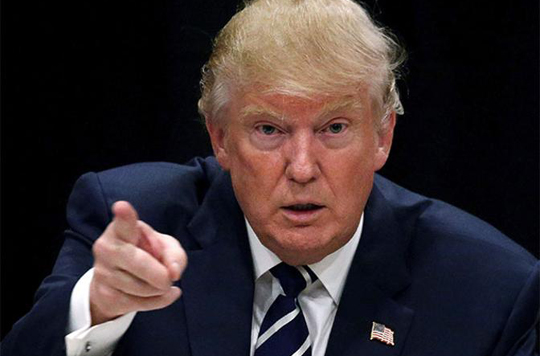Washington, Mar 25: President Donald Trump has expressed disappointment as he faced a severe political defeat after Republicans abandoned their effort to repeal and replace Obamacare policy with a new healthcare bill, due to lack of votes in the US House of Representatives.

Trump's disappointment came after House Speaker Paul Ryan failed to garner enough votes for the passage of the new healthcare bill. Trump had issued an ultimatum to his fellow Republicans after his administration failed to garner enough support for it.
The US House of Representatives –-- similar to the Lok Sabha of the Indian Parliament –-- has 435 members. The Republican party enjoys a simple majority in the House with 235 members.
However due to opposition from some of its own party lawmakers, in particular the one that have grouped themselves under the banner of Freedom Caucus, Ryan, who had been leading the effort on behalf of Trump, could not muster the majority 215 votes.
As a result, in an effort to avoid the humiliation of a defeat, Ryan announced that he was withdrawing the move to have a vote on Affordable Care Act (Obamacare). Unlike India, the US Congress does not have an anti-defection bill, as a result of which US lawmakers are free to exercise their right to vote on a bill as per their wish and not according to dictate of the party leadership.
Blaming the opposition democrats for the failure, Trump warned that now Obamacare is going to stay, people would see a sudden rise in their insurance premium. "It's going to happen (explode). There's not much you can do about it. Bad things are going to happen. There's not much you can do to help it. I've been saying that for a year and a half. It's not sustainable. There's no way out," Trump told reporters at the White House after the bill was withdrawn.
"As we got closer and closer everyone was talking about how wonderful (Obamacare) was. Now it will go back to real life, people will see how bad it is and it's getting much worse. When President Obama left, 2017 was going to be a very bad year for Obamacare," Trump said.
"Going to see explosive premium increases and the deductibles are so high that no one is going to be able to use it," he said.
Having fought and won the presidential elections on the platform of repealing and replacing Obamacare, Trump said he honestly believe that the Democrats will come to the Republicans and say "let's get together and get a great health care bill or plan that's really great" for the people in this country.
"I think that's going to happen," he said. Trump said he was very close to getting enough votes in the House, but fell short of 10-15 votes. "We were very very close. It was a very tight margin. We had no Democratic support," the President said.
"I've been saying for the last year and a half that the best thing we could do, politically speaking, is let Obamacare explode. It's exploding right now," he said. "We couldn't quite get there, we were a small number of votes short. There are many people who don't realise how good our bill was," he said adding that the people don't realise there were two legislative phases to go.
"If (Democrats) got together with us, and got us a real health care bill, I'd be totally okay with that. The losers are Nancy Pelosi and Chuck Schumer, because they own Obamacare. They 100 per cent own it. They have Obamacare for a little while longer until it ceases to exist, which it will at some point in the near future," Trump said.
"When they all become, civilised and get together, and try to work out a great health care bill for the people of this country, we're open to it," he said. Trump told reporters that he would now focus his attention on tax reforms.
"We are going, right now, for tax reform. Which we could've done earlier but this really would've worked out better if we could've had Democrat support. Remember we had no Democrat support. So now we're going to go for tax reform,"he said.
The President replied in negative when he was asked if he felt betrayed by the Freedom caucus within the Republican Party. "I'm not betrayed. They're friends of mine. I'm disappointed because we could've had it. So I'm disappointed. I'm a little surprised I could tell you. We really had it, it was pretty much there. but what's going to come out of it is a better bill," he said.
"Because there were things in his bill that I didn't particularly like. But both parties can get together and do real health care. Obamacare was rammed down everyone's throat. 100 per cent Democrat. Having bipartisan would be a big, big improvement. I'm disappointed but I'm friends of mine. You know this is a very hard time for them," Trump said.






Comments
Add new comment